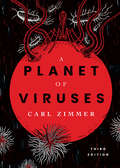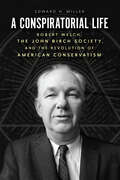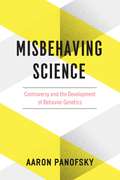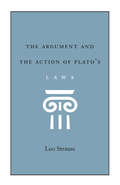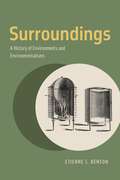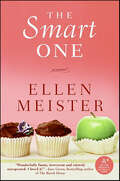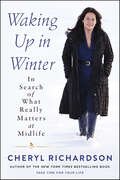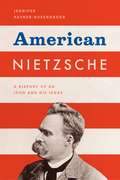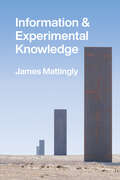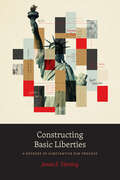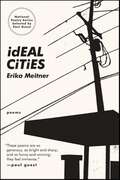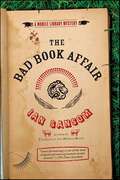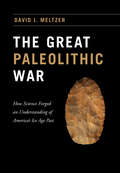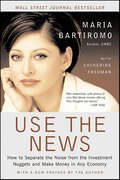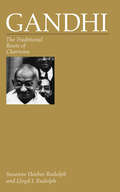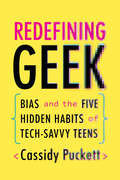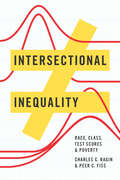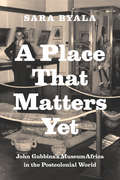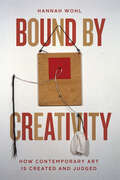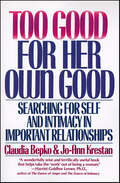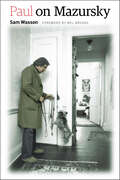- Table View
- List View
A Planet of Viruses: Third Edition
by Carl Zimmer&“A captivating primer to the world of viruses that requires zero background in biology . . . a suitable first introduction to this fascinating part of our world.&” —The Inquisitive Biologist In 2020, an invisible germ—a virus—emerged and wholly upended our lives. We&’ve now become familiar with the new virus that gave us Covid-19—but viruses also cause a vast range of other diseases, including one disorder that makes people sprout branch-like growths as if they were trees. Viruses have been a part of our lives for so long that we are actually part virus: the human genome contains more DNA from viruses than our own genes. Meanwhile, scientists are discovering viruses everywhere they look: in the soil, in the ocean, even in deep caves miles underground. Fully revised and updated, with new illustrations and a new chapter about coronaviruses and the spread of Covid-19, this third edition of Carl Zimmer&’s &“information-packed, superbly readable&” A Planet of Viruses (Booklist, starred review) pulls back the veil on this hidden world. It presents the latest research on how viruses hold sway over our lives and our biosphere, how viruses helped give rise to the first life-forms, how viruses are producing new diseases, how we can harness viruses for our own ends, and how viruses will continue to control our fate as long as life endures. &“Zimmer is one of the best science writers we have today.&” —Rebecca Skloot, New York Times–bestselling author of The Immortal Life of Henrietta Lacks
Collected Poems (Wesleyan Poetry Series)
by Joseph CeravoloLike an underground river, the astonishing poems of Joseph Ceravolo have nurtured American poetry for fifty years, a presence deeply felt but largely invisible. Collected Poems offers the first full portrait of Ceravolo's aesthetic trajectory, bringing to light the highly original voice that was operating at an increasing remove from the currents of the time. From a poetics associated with Frank O'Hara and John Ashbery to an ever more contemplative, deeply visionary poetics similar in sensibility to Zen and Dante, William Blake and St. John of the Cross, this collection shows how Ceravolo's poetry takes on a direct, quiet lyricism: intensely dedicated to the natural and spiritual life of the individual. As Ron Silliman notes, Ceravolo's later work reveals him to be "one of the most emotionally open, vulnerable and self-knowing poets of his generation." Many new pieces, including the masterful long poem "The Hellgate," are published here for the first time. This volume is a landmark edition for American poetry, and includes an introduction by David Lehman.
A Conspiratorial Life: Robert Welch, the John Birch Society, and the Revolution of American Conservatism
by Edward H. Miller“A cleverly written, finely textured, and badly needed study of a pivotal and too-often marginalized figure in the development of the modern American Right.” —The Journal of Southern History Though you may not know his name, Robert Welch (1899-1985)—founder of the John Birch Society—is easily one of the most significant architects of our current political moment. In A Conspiratorial Life, the first full-scale biography of Welch, Edward H. Miller delves deep into the life of an overlooked figure whose ideas nevertheless reshaped the American right.A child prodigy who entered college at age twelve, Welch became an unlikely candy magnate, founding the company that created Sugar Daddies, Junior Mints, and other famed confections. In 1958, he funneled his wealth into establishing the organization that would define his legacy and change the face of American politics: the John Birch Society. Though the group’s paranoiac right-wing nativism was dismissed by conservative thinkers like William F. Buckley, its ideas gradually moved from the far-right fringe into the mainstream. By exploring the development of Welch’s political worldview, A Conspiratorial Life shows how the John Birch Society’s rabid libertarianism—and its highly effective grassroots networking—became a profound, yet often ignored or derided influence on the modern Republican Party. Miller convincingly connects the accusatory conservatism of the midcentury John Birch Society to the inflammatory rhetoric of the Tea Party, the Trump administration, Q, and more. As this book makes clear, whether or not you know his name or what he accomplished, it’s hard to deny that we’re living in Robert Welch’s America.“Offers a good angle from which to appraise the fractured state of American conservatism.” —Financial Times
Misbehaving Science: Controversy and the Development of Behavior Genetics
by Aaron PanofskyBehavior genetics has always been a breeding ground for controversies. From the “criminal chromosome” to the “gay gene,” claims about the influence of genes like these have led to often vitriolic national debates about race, class, and inequality. Many behavior geneticists have encountered accusations of racism and have had their scientific authority and credibility questioned, ruining reputations, and threatening their access to coveted resources. In Misbehaving Science, Aaron Panofsky traces the field of behavior genetics back to its origins in the 1950s, telling the story through close looks at five major controversies. In the process, Panofsky argues that persistent, ungovernable controversy in behavior genetics is due to the broken hierarchies within the field. All authority and scientific norms are questioned, while the absence of unanimously accepted methods and theories leaves a foundationless field, where disorder is ongoing. Critics charge behavior geneticists with political motivations; champions say they merely follow the data where they lead. But Panofsky shows how pragmatic coping with repeated controversies drives their scientific actions. Ironically, behavior geneticists’ struggles for scientific authority and efforts to deal with the threats to their legitimacy and autonomy have made controversy inevitable—and in some ways essential—to the study of behavior genetics.
Walking on Air: A Novel
by R.S. JonesWilliam Addams is dying. Controlling, mercurial, and estranged from his family, he is consumed by the fear that he'll be abandoned by Henry and Susan, his closest friends, the only people on whom he can rely.What he wants is for their faithfulness to last until they take him home to his beloved house to die. But as William's condition worsens, it becomes apparent that his expectations of devotion and loyalty involve not simply a loving commitment but the virtual handing over of his friends' vitality and independence; indeed, William covets their very lives.Filled with penetrating insights and dazzling beauty, Walking on Air explores the shadowy, often disturbing parameters of devotion, demonstrating its inevitable limits as well as its astounding powers of transformation.
The Argument and the Action of Plato's Laws
by Leo StraussThe posthumous publication of The Argument and the Action of Plato's "Laws" was compiled shortly before the death of Leo Strauss in 1973. Strauss offers an insightful and instructive reading through careful probing of Plato's classic text. "Strauss's The Argument and the Action of Plato's 'Laws' reflects his interest in political thought, his dogged method of following the argument of the Laws step by step, and his vigorous defense of this dialogue's integrity in respect to the ideals of the Republic."—Cross Currents "The unique characteristics of this commentary on the Laws reflect the care and precision which were the marks of Professor Strauss's efforts to understand the complex thoughts of other men."—Allan D. Nelson, Canadian Journal of Political Science "Thorough and provocative, an important addition to Plato scholarship."—Library Journal "The major purpose of the commentary is to provide a reading of the dialogue which displays its structural arrangement and the continuity of the argument."—J. W. Dy, Bibliographical Bulletin of Philosophy "The reader of Strauss's book is indeed guided closely through the whole text."— M. J. Silverthorne, The Humanities Association Review Leo Strauss (1899-1973) was the Robert Maynard Hutchins Distinguished Service Professor Emeritus of political science at the University of Chicago.
Surroundings: A History of Environments and Environmentalisms
by Etienne S. BensonGiven the ubiquity of environmental rhetoric in the modern world, it’s easy to think that the meaning of the terms environment and environmentalism are and always have been self-evident. But in Surroundings, we learn that the environmental past is much more complex than it seems at first glance. In this wide-ranging history of the concept, Etienne S. Benson uncovers the diversity of forms that environmentalism has taken over the last two centuries and opens our eyes to the promising new varieties of environmentalism that are emerging today. Through a series of richly contextualized case studies, Benson shows us how and why particular groups of people—from naturalists in Napoleonic France in the 1790s to global climate change activists today—adopted the concept of environment and adapted it to their specific needs and challenges. Bold and deeply researched, Surroundings challenges much of what we think we know about what an environment is, why we should care about it, and how we can protect it.
The Smart One: A Novel
by Ellen MeisterBev is the Smart One, who finally leaves her artistic ambitions in chalk dust (and her humor-impaired husband in the arms—and legs—of his nubile protégée) to become a schoolteacher. Clare is the Pretty One, who married well and seems to be living a designer version of the suburban dream. Joey is the Wild One, struggling to stay clean and sober now that she's used up her fifteen minutes of fame as a one-hit-wonder rock star.They love each other but mix like oil, water, and hundred-proof gin . . . a combination that threatens to combust over family tensions, suspected infidelities, a devastating accident, a stunning confession, and the sudden reappearance of their handsome, now all-grown-up former neighbor, Kenny Waxman, who's back in town making his mark as a TV comedy writer.It seems they'll never understand where their differences begin and their own destructive tendencies end. Then it happens: the sisters discover a decades-old body stuffed inside an industrial drum and begin a bold, heartbreaking, and sometimes hilarious journey that will either bring them together . . . or tear them apart for good.
Waking Up in Winter: In Search of What Really Matters at Midlife
by Cheryl RichardsonInternationally recognized coach and New York Times bestselling author Cheryl Richardson has toured the world empowering others to make lasting change. But when Richardson’s own life no longer worked as it once had, a persistent, inner voice offered unmistakable guidance: it was time to reevaluate her life to uncover what really mattered.Waking Up in Winter is the candid and revelatory account of how at midlife, Richardson found renewed contentment and purpose through a heroic, inward journey. The unfolding story, told through intimate journal entries, follows Richardson from the first, gentle nudges of change to a thoughtfully reimagined life – a soulful, spring awakening.With an experienced coach’s intuition and an artist’s eye, Richardson reexamines everything – her marriage, her work, her friendships, and her priorities – gracefully shedding parts of the self that no longer serve along the way. In the end, she not only discovers what really matters at midlife, she invites readers to join her in the inquiry process by providing thought-provoking questions designed to usher them through their own season of transformation. Offering up Richardson’s most powerful teaching tool yet – her own life – Waking Up in Winter takes readers on a brave, spiritual adventure that shows us all how to live a more authentic and meaningful life.
American Nietzsche: A History of an Icon and His Ideas
by Jennifer Ratner-RosenhagenIf you were looking for a philosopher likely to appeal to Americans, Friedrich Nietzsche would be far from your first choice. After all, in his blazing career, Nietzsche took aim at nearly all the foundations of modern American life: Christian morality, the Enlightenment faith in reason, and the idea of human equality. Despite that, for more than a century Nietzsche has been a hugely popular—and surprisingly influential—figure in American thought and culture. In American Nietzsche, Jennifer Ratner-Rosenhagen delves deeply into Nietzsche's philosophy, and America’s reception of it, to tell the story of his curious appeal. Beginning her account with Ralph Waldo Emerson, whom the seventeen-year-old Nietzsche read fervently, she shows how Nietzsche’s ideas first burst on American shores at the turn of the twentieth century, and how they continued alternately to invigorate and to shock Americans for the century to come. She also delineates the broader intellectual and cultural contexts within which a wide array of commentators—academic and armchair philosophers, theologians and atheists, romantic poets and hard-nosed empiricists, and political ideologues and apostates from the Left and the Right—drew insight and inspiration from Nietzsche’s claims for the death of God, his challenge to universal truth, and his insistence on the interpretive nature of all human thought and beliefs. At the same time, she explores how his image as an iconoclastic immoralist was put to work in American popular culture, making Nietzsche an unlikely posthumous celebrity capable of inspiring both teenagers and scholars alike. A penetrating examination of a powerful but little-explored undercurrent of twentieth-century American thought and culture, American Nietzsche dramatically recasts our understanding of American intellectual life—and puts Nietzsche squarely at its heart.
Information & Experimental Knowledge
by James MattinglyAn ambitious new model of experimentation that will reorient our understanding of the key features of experimental practice. What is experimental knowledge, and how do we get it? While there is general agreement that experiment is a crucial source of scientific knowledge, how experiment generates that knowledge is far more contentious. In this book, philosopher of science James Mattingly explains how experiments function. Specifically, he discusses what it is about experimental practice that transforms observations of what may be very localized, particular, isolated systems into what may be global, general, integrated empirical knowledge. Mattingly argues that the purpose of experimentation is the same as the purpose of any other knowledge-generating enterprise—to change the state of information of the knower. This trivial-seeming point has a non-trivial consequence: to understand a knowledge-generating enterprise, we should follow the flow of information. Therefore, the account of experimental knowledge Mattingly provides is based on understanding how information flows in experiments: what facilitates that flow, what hinders it, and what characteristics allow it to flow from system to system, into the heads of researchers, and finally into our store of scientific knowledge.
Constructing Basic Liberties: A Defense of Substantive Due Process
by James E. FlemingA strong and lively defense of substantive due process. From reproductive rights to marriage for same-sex couples, many of our basic liberties owe their protection to landmark Supreme Court decisions that have hinged on the doctrine of substantive due process. This doctrine is controversial—a battleground for opposing views around the relationship between law and morality in circumstances of moral pluralism—and is deeply vulnerable today. Against recurring charges that the practice of substantive due process is dangerously indeterminate and irredeemably undemocratic, Constructing Basic Liberties reveals the underlying coherence and structure of substantive due process and defends it as integral to our constitutional democracy. Reviewing the development of the doctrine over the last half-century, James E. Fleming rebuts popular arguments against substantive due process and shows that the Supreme Court has constructed basic liberties through common law constitutional interpretation: reasoning by analogy from one case to the next and making complex normative judgments about what basic liberties are significant for personal self-government. Elaborating key distinctions and tools for interpretation, Fleming makes a powerful case that substantive due process is a worthy practice that is based on the best understanding of our constitutional commitments to protecting ordered liberty and securing the status and benefits of equal citizenship for all.
Ideal Cities: Poems (National Poetry Series)
by Erika Meitner“These poems are so generous, so bright and sharp, so funny and winning, they feel immense.” —Paul Guest“Erika Meitner is the new voice of intelligent and emotional poems. Good for poetry. Good for poetry lovers. Good for the rest of us, too.”— Nikki Giovanni Exploring themes of pregnancy, motherhood, ancestry, and life in the borderline slums of Washington, DC, the richly felt and adroit poetry of Erika Meitner’s Ideal Cities moves, mesmerizes, and delights. The work of an important emerging voice in contemporary American poetry—a winner of the 2009 National Poetry Series Prize as selected by Paul Guest—Ideal Cities gloriously perpetuates NPS’s long-standing tradition of promoting exceptional poetry from lesser-known poets.
Angels and Goddesses: Manifest Your Desires with Angelic Intelligence
by Crystal PomeroyConnect to the Sacred Feminine with Archangels and their Companion GoddessesAngels are here to help us deepen our hidden powers—from healing, compassion, and transmutation to faith, courage, focus, and manifestation. But these light beings are not alone. Crystal Pomeroy shares their ancient connections to goddesses worldwide. Learn who they are, how they can help, and what you can do to receive their support.Turn on your angelic intelligence and increase your spiritual powersUncover the roots of the archangels in pre-religious traditionsWork with angels and goddesses to retrieve your sacred feminine and sacred masculine powersDiscover the angelic network behind world traditions and the miraculous difference it can bring to your own inner workWith dozens of hands-on invocations, affirmations, visualizations, and rituals, Crystal teaches us how to work with angels and their goddess companions from around the world. Crystal also provides step-by-step instructions for healing and prosperity mandalas, an angelic dream journal, a marigold love blessing, and more. By activating our Angelic Intelligence, we can manifest our desires while restoring our confidence and true power.
The Bad Book Affair (The Mobile Library Mystery Series)
by Ian Sansom“[Israel’s] fish-out-of-water dilemmas and encounters with kooky locals will resonate with Alexander McCall Smith fans.” —Publishers WeeklyAuthor Ian Sansom “clearly loves a good laugh” (Washington Post), as his delightful mystery series featuring rumpled, fish-out-of-water, Jewish vegetarian librarian Israel Armstrong indisputably proves. The Bad Book Affair is Israel’s fourth hilarious adventure as he tools around Ireland in a rattletrap bookmobile trying to solve the mystery of a missing teenage girl while trying to keep his mess of a personal life in order. Sansom’s Mobile Library Mystery series has made a big splash with critics on both sides of “the Pond.” The New York Times Book Review loves their “formidable reserves of insight and humor,”while the London Times calls Israel “one of the most original and exciting amateur sleuths around.”
The Great Paleolithic War: How Science Forged an Understanding of America's Ice Age Past
by David J. MeltzerFollowing the discovery in Europe in the late 1850s that humanity had roots predating known history and reaching deep into the Pleistocene era, scientists wondered whether North American prehistory might be just as ancient. And why not? The geological strata seemed exactly analogous between America and Europe, which would lead one to believe that North American humanity ought to be as old as the European variety. This idea set off an eager race for evidence of the people who might have occupied North America during the Ice Age—a long, and, as it turned out, bitter and controversial search. In The Great Paleolithic War, David J. Meltzer tells the story of a scientific quest that set off one of the longest-running feuds in the history of American anthropology, one so vicious at times that anthropologists were deliberately frightened away from investigating potential sites. Through his book, we come to understand how and why this controversy developed and stubbornly persisted for as long as it did; and how, in the process, it revolutionized American archaeology.
Use the News: How to Separate the Noise from the Investment Nuggets and Make Money in Any Economy
by Maria Bartiromo Catherine FredmanExplaining the methods that have made her -- and her stock picks -- famous, Maria Bartiromo tells investors how to use hot information to make money in any market, raging bull or lumbering bear. Packed with sage advice from the most influential people on Wall Street, Use the News is an indispensable investment handbook that will disclose the Wall Street insiders' secrets and show you how to take control of your investments.
Gandhi: The Traditional Roots of Charisma
by Susanne Hoeber Rudolph Lloyd I. RudolphThe Rudolphs' analysis reveals that Gandhi's charisma was deeply rooted in the aspects of Indian tradition that he interpreted for his time. They key to his political influence was his ability to realize in both his daily life and his public actions, cultural ideals that many Indians honored but could not enact themselves—ideals such as the traditional Hindu belief that a person's capacity for self-control enhances his capacity to control his environment. Appealing to shared expectations and recognitions, Gandhi was able to revitalize tradition while simultaneously breaking with some of its entrenched values, practices, and interests. One result was a self-critical, ethical, and inclusive nationalist movement that eventually led to independence.
Redefining Geek: Bias and the Five Hidden Habits of Tech-Savvy Teens
by Cassidy PuckettA surprising and deeply researched look at how everyone can develop tech fluency by focusing on five easily developed learning habits.Picture a typical computer geek. Likely white, male, and someone you’d say has a “natural instinct” for technology. Yet, after six years teaching technology classes to first-generation, low-income middle school students in Oakland, California, Cassidy Puckett has seen firsthand that being good with technology is not something people are born with—it’s something they learn. In Redefining Geek, she overturns the stereotypes around the digitally savvy and identifies the habits that can help everyone cultivate their inner geek.Drawing on observations and interviews with a diverse group of students around the country, Puckett zeroes in on five technology learning habits that enable tech-savvy teens to learn new technologies: a willingness to try and fail, management of frustration and boredom, use of models, and the abilities to use design logic and identify efficiencies. In Redefining Geek, she shows how to measure and build these habits, and she demonstrates how many teens historically marginalized in STEM are already using these habits and would benefit from recognition for their talent, access to further learning opportunities, and support in career pathways. She argues that if we can develop, recognize, and reward these technological learning habits in all kids—especially girls and historically marginalized racial and ethnic groups—we can address many educational inequities and disparities in STEM.Revealing how being good with technology is not about natural ability but habit and persistence, Redefining Geek speaks to the ongoing conversation on equity in technology education and argues for a more inclusive technology learning experience for all students.
Intersectional Inequality: Race, Class, Test Scores, & Poverty
by Charles C. Ragin Peer C. FissFor over twenty-five years, Charles C. Ragin has developed Qualitative Comparative Analysis and related set-analytic techniques as a means of bridging qualitative and quantitative methods of research. Now, with Peer C. Fiss, Ragin uses these impressive new tools to unravel the varied conditions affecting life chances. Ragin and Fiss begin by taking up the controversy regarding the relative importance of test scores versus socioeconomic background on life chances, a debate that has raged since the 1994 publication of Richard Herrnstein and Charles Murray’s TheBell Curve. In contrast to prior work, Ragin and Fiss bring an intersectional approach to the evidence, analyzing the different ways that advantages and disadvantages combine in their impact on life chances. Moving beyond controversy and fixed policy positions, the authors propose sophisticated new methods of analysis to underscore the importance of attending to configurations of race, gender, family background, educational achievement, and related conditions when addressing social inequality in America today.
A Place That Matters Yet: John Gubbins's MuseumAfrica in the Postcolonial World
by Sara ByalaA Place That Matters Yet unearths the little-known story of Johannesburg’s MuseumAfrica, a South African history museum that embodies one of the most dynamic and fraught stories of colonialism and postcolonialism, its life spanning the eras before, during, and after apartheid. Sara Byala, in examining this story, sheds new light not only on racism and its institutionalization in South Africa but also on the problems facing any museum that is charged with navigating colonial history from a postcolonial perspective. Drawing on thirty years of personal letters and public writings by museum founder John Gubbins, Byala paints a picture of a uniquely progressive colonist, focusing on his philosophical notion of “three-dimensional thinking,” which aimed to transcend binaries and thus—quite explicitly—racism. Unfortunately, Gubbins died within weeks of the museum’s opening, and his hopes would go unrealized as the museum fell in line with emergent apartheid politics. Following the museum through this transformation and on to its 1994 reconfiguration as a post-apartheid institution, Byala showcases it as a rich—and problematic—archive of both material culture and the ideas that surround that culture, arguing for its continued importance in the establishment of a unified South Africa.
Bound by Creativity: How Contemporary Art Is Created and Judged
by Hannah WohlWhat is creativity? While our traditional view of creative work might lead us to think of artists as solitary visionaries, the creative process is profoundly influenced by social interactions even when artists work alone. Sociologist Hannah Wohl draws on more than one hundred interviews and two years of ethnographic research in the New York contemporary art market to develop a rich sociological perspective of creativity. From inside the studio, we see how artists experiment with new ideas and decide which works to abandon, destroy, put into storage, or exhibit. Wohl then transports readers into the art world, where we discover how artists’ understandings of their work are shaped through interactions in studio visits, galleries, international art fairs, and collectors’ homes. Bound by Creativity reveals how artists develop conceptions of their distinctive creative visions through experimentation and social interactions. Ultimately, we come to appreciate how judgment is integral to the creative process, both resulting in the creation of original works while also limiting an artist’s ability to break new ground. Exploring creativity through the lens of judgment sheds new light on the production of cultural objects, markets, and prestige.
Too Good For Her Own Good: Searching for Self and Intimacy in Important Relationships
by Claudia Bepko Jo-Ann KrestanIn the bestselling tradition of The Dance of Anger, a compassionate and insightful guide that shows women how they can learn to feel good about who they are and what they do.
Paul on Mazursky (Wesleyan Film)
by Sam WassonPaul Mazursky's nearly twenty films as writer/director represent Hollywood's most sustained comic expression of the 1970s and 1980s. But they have not been given their due, perhaps because Mazursky's films—both sincere and ridiculous, realistic and romantic—are pure emotion. This makes films like Bob & Carol & Ted & Alice, An Unmarried Woman, and Enemies, A Love Story difficult to classify, but that's what makes a human comedy human. In the first ever book-length examination of one of America's most important and least appreciated filmmakers, Sam Wasson sits down with Mazursky himself to talk about his movies and how he makes them. Going over Mazursky's oeuvre one film at a time, interviewer and interviewee delve into the director's life in and out of Hollywood, laughing, talking, and above all else, feeling—like Mazursky's people always do. The book includes a filmography and never-before-seen photos.
Llewellyn's 2023 Magical Almanac: Practical Magic for Everyday Living
by LlewellynBreathe new life into your magical practice with Llewellyn's 2023 Magical Almanac. For more than thirty years, this almanac has provided useful spells, rituals, and ideas that inspire all levels of practitioners to improve their connection to magical energies and elements.This year's edition features dozens of captivating articles, grouped by element, on coin magic, Afro-Caribbean Witchcraft, the magic of scent, nonverbal quarter calls, fire dance magic, nightmare protection, palm tree magic, sabbath guided meditation, and more. You'll also enjoy a fantastic coloring section with coloring pages, color correspondences, and two spells to be used with the coloring pages.
